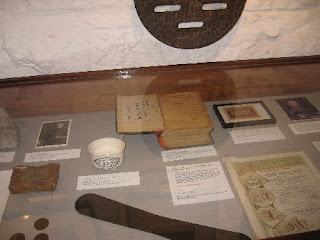23.05.2015. James Joyce. Martello Tower. Sandycove.
Sandycove (
Irish:
Cuas an Ghainimh) is an area of Dublin, Ireland. It is a popular seaside resort.
The writer James Joyce
lived for a week as a young man in the Martello Tower, The most famous Tower in Dublin is Tower No. 11, in Sandycove Co.
Dublin. It is known as Joyce’s Tower, a Museum dedicated to one of
Irelands most talented authors James Joyce. He stayed in the tower in
Sandy cove, and it is believed that James Joyce got inspiration there
for one of his most famous works “Ulysses“. The museum is open to the
public during the summer months, a must-see on the list of top Dublin
attractions connected to James Joyce. Martello Tower is situated beside the Forty foot bathing place at Sandycove. The opening scene of Joyce' Ulysses is set in this tower.
It now hosts a small Joycean museum, open all year round
Bloomsday is celebrated in Sandycove in Joyce's honour on the 16th of June every year.
Martello towers, sometimes known simply as Martellos, are small defensive forts, that were builtt across the British Empire during the 19th century, and not only. Most were coastal forts. Along the whole Adriatic coast we can see this tipical tower.
Walking through Sandycove.
The Irish sea.
Alida, Nela i Danijela.
Since the 15th century, the Corsicans had built similar towers at
strategic points around the island to protect coastal villages and
shipping from North African
pirates.
The towers stood one or two storeys high and measured 12–15 m
(39–49 ft) in diameter, with a single doorway five metres off the ground
that one could access only via a ladder which the occupants could
remove.
[2]
Local villagers paid for the towers and watchmen, known as
torregiani,
who would signal the approach of unexpected ships by lighting a beacon
fire on the tower's roof. The fire would alert the local defence forces
to the threat. Although the pirate threat subsequently dwindled, the
Genovese built a newer generation of circular towers (the
Genoese towers), that warded off later foreign invasions.
(from Internet. I wish you a nice surfing.) But make a nice walk all around our Pula; from Premantura till Peroj and Barbariga you will enjoyed in seesitting of Martello towers even in Peroj, on the beach Bođinka.
The James Joyce Tower was one of a series of Martello towers built to
withstand an invasion by Napoleon and now holds a museum devoted to the
life and works of James Joyce, who made the tower the setting for the
first chapter of his masterpiece, Ulysses.
Beautifully located eight miles south of Dublin on the coast
road, this tower is the perfect setting for a museum dedicated to Joyce,
a writer of international renown who remains, world-wide, the writer
most associated with Dublin.
Joyce's brief stay here inspired the opening of his great novel
Ulysses. The gun platform with its panoramic view, and the living room
inside the tower are much as he described them in his book.
The museum's collection includes letters, photographs, first and
rare editions and personal possessions of Joyce, as well as items
associated with the Dublin of Ulysses.
Ulysses was set on 16th June 1904. On Bloomsday, 16th June, the museum will be open from 8am-6pm for readings and celebrations.
The wiev to the Dublin bay and more. Images from inside of the Martello Tower.
Dubliners is a collection of fifteen short stories by James Joyce. first published in 1914.
They form a naturalistic depiction of of Irissh middle class life in and around Dublin in the anda around Dublin in the early years of the 20th
The stories were written when when Irish naionalism was at its peak, and a search for a national identity and purpose was
raging; at a crossroads of history and culture, Ireland was jolted by
various converging ideas and influences. They centre on Joyce's idea of
an epiphany
: a moment where a character experiences a life-changing self-understanding or illumination. Many of the characters in
Dubliners later appear in minor roles in Joyce's novel
Ulysses.
The initial stories in the collection are narrated by child
protagonists, and as the stories continue, they deal with the lives and
concerns of progressively older people. This is in line with Joyce's
tripartite division of the collection into childhood, adolescence and
maturity.
http://www.literarytraveler.com/articles/james-joyce-and-the-golden-gate-of-pula/

I wish that Pula will be elected to European Capital of Culture.
































 BUSINES AND PROFESIONAL WOMAN PULA 05.03.2001-05.03.2016.
BUSINES AND PROFESIONAL WOMAN PULA 05.03.2001-05.03.2016.























